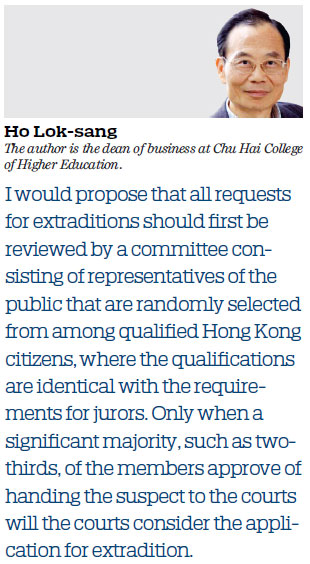Way to ease concerns over the fugitive law
Updated: 2019-04-09 08:21
By Ho Lok-sang(HK Edition)
|
|||||||
Ho Lok-sang defends proposed amendments, as they are needed to preserve the good name of HK as a jurisdiction that upholds the rule of law
The Hong Kong Bar Association has called upon the SAR government to extend the period of consultation for the Fugitive Offenders and Mutual Legal Assistance in Criminal Matters Legislation (Amendment) Bill 2019. It called the proposals "controversial and worrying," and noted that "the government cannot give any assurance that the proposed amendments will result in a favorable resolution." Unfortunately, it is also clear that even "a full and wide-ranging consultation" will still not turn a lack of trust into trust. Accordingly, I venture to propose a mechanism that will assure the public that any request for extradition will go through such due process that will put any worries people may have to rest.
First of all, we take it as a fact that some people do worry that our courts may choose to, be persuaded to, or be forced to cooperate with mainland authorities even when they have concerns over the appropriateness of the charge.
We also have to take it as a fact that some people remain worried even though the Secretary of Security John Lee Ka-chiu had made various assurances, including first that no one will be extradited unless charged with a criminal offense that is also consider an offense in Hong Kong, that the punishment arising from the offense elicits a minimum sentence of three years, and that the request from the mainland should come from the central government and not a local government.

If people are worried, then consultation will not alleviate these concerns. The only thing that will are sufficiently reassuring provisions in the law. Accordingly, I would propose that all requests for extraditions should first be reviewed by a committee consisting of representatives of the public that are randomly selected from among qualified Hong Kong citizens, where the qualifications are identical with the requirements for jurors. Only when a significant majority, such as two-thirds, of the members approve of handing the suspect to the courts will the courts consider the application for extradition.
Apart from this, this Committee for Vetting Suspects under Request for Extradition can impose conditions for extradition, such as the maximum sentence or exclusion of the death penalty, the alleged offense, and open hearing.
The proposed mechanism will ensure that any concerns over courts acting under undue political influence will be put to rest. It will also allow impositions of conditions such that other worries will be put to rest.
Over concerns voiced by the business sector, the government has agreed that extradition under the amendment bill should not apply to nine types of commercial crimes. But this has caused concerns that fairness or justice may be sacrificed. One editorial in a local newspaper remarked: "As all are equal before the law, on no grounds should white-collar offenders enjoy the privilege of being exempted from extradition." Contravening basic principles of justice would make a mockery of Hong Kong's justice system. The editorial warned: The exclusion "may turn Hong Kong into a haven to business criminals."
Still another concern is the suggestion that any amendment of the law should not take effect retrospectively. In general, if an act that was not illegal before a new law is passed, that new law should not retroactively incriminate someone who never made any offense under the law of the time. Extradition is quite a different matter. The proposed amendment is in order to plug a loophole that should not have existed. It will not incriminate someone who had never committed an offense. If plugging the loophole due to the non-existence of extradition arrangements before the amendment is not allowed, then even the video-implicated suspect charged with as grave an offense as murdering a woman in Taiwan would be able to go free after serving a sentence for stealing.
Legal reform is a very serious matter anywhere, but it is especially important for Hong Kong as a global financial center. We desperately need to preserve the good name of Hong Kong as a jurisdiction that upholds the rule of law. This must include extradition of criminals to jurisdictions where the offense is committed. Basic principles of justice must not be compromised.
Like any reform, the government will expect opposition, because any reform will touch the interests of some groups. But the existence of opposition should not deter the reform. Instead, the government should boldly come forward with a solution that will address the concerns of the public. Extending the period of consultation will not alleviate the lack of trust. Exempting some white-collar crimes from the proposed change will raise more questions than answers. Offering a cut-off line to exempt past offenders from being extradited, as legislator Paul Tse Wai-chun recently proposed, does not square with the requirements of justice.
My proposal is designed to address the core concern of the "pan-democrats" and that of others who are worried about the legal system on the mainland. It is still a preliminary proposal. I welcome any proposed modifications to it from all quarters.
(HK Edition 04/09/2019 page8)